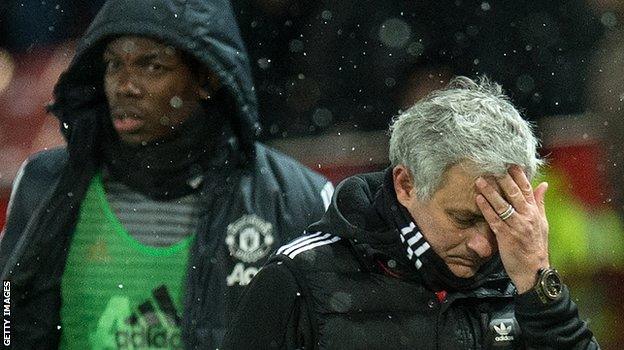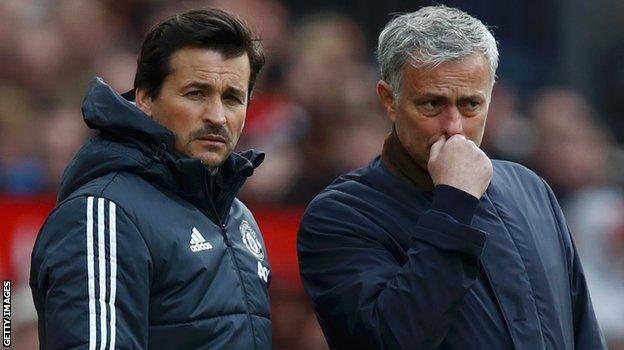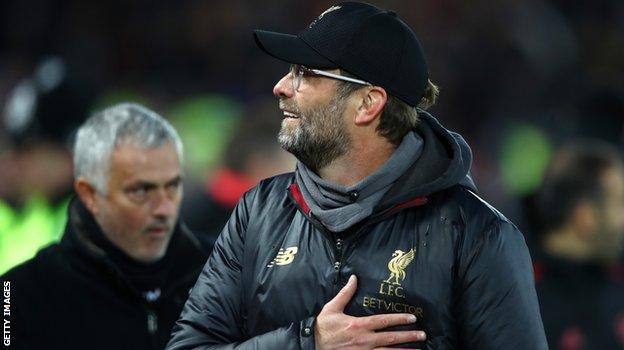Jose Mourinho: An analogue manager in a digital world? Guillem Balague column
- Published


Guillem Balague is the host of BBC Radio 5 live's Football Daily podcast on Thursdays covering European football. Here he gives his view on Jose Mourinho's current standing in football management.
Having been told by executive vice-chairman Ed Woodward that his tenure at Manchester United was at an end, an unshaven Jose Mourinho spent around an hour and a half at the club's Carrington training base in an atmosphere described by some of those present as "awkward".
The Portuguese manager, surrounded by his assistants, decided against embarking on a painful tour of goodbyes, contenting himself with informing those who crossed his path on that final day.
The Mourinho seen coming out of Carrington was smiling, shaven, suddenly younger. Was it relief or just the wish to give the impression he was relieved?
You never fully know with Mourinho because with him you always get two people in one, the public image and the private persona - jovial and friendly or prickly and curt, but either way methodical in most of the things he does, especially when it involves an audience.
Those who have worked with him in the past few years, not only at Carrington, admit they were not sure which Mourinho they were going to encounter from one day to another. To me, the whole thing seems mostly an act.
So what's next for him?
Speaking to coaches and players who have worked under him, as well as rival managers, sports psychologists and insiders at the clubs where he has been - who, not surprisingly, prefer not to be quoted - the most common conclusion is that football has overtaken Mourinho.
Have his methods become outdated?

Mourinho fell out with France international Paul Pogba in his time at United
Mourinho was an early adopter of a coaching methodology born in Portugal, called 'tactical periodisation' (it's pretty complex but you can read a detailed explanation of it here, external.) Indeed, for many young coaches he would become its guru.
But the game evolves. In the past few years Mourinho has been trying to reproduce a way of working and thinking that many feel has already had its day. Despite the success - albeit perhaps below their elevated expectations - he enjoyed at Real Madrid, his philosophy had not fully worked there.
In Spain, players including Cristiano Ronaldo had begun to challenge him. The issues persisted in his second spell at Chelsea, where it is fair to say he left few friends behind when he was sacked in 2015. In fact, those who worked with him in his first period in London reckon he was a totally different man the second time around.
Players have changed significantly since Mourinho's successes in the early 2000s. It is difficult to find a Deco, John Terry, Frank Lampard or Ricardo Carvalho these days.
The best Mourinho teams won by defending in their box. Creating a chance against them was a minor miracle, and games were often won by his players appreciating the small details - set-pieces, counter-attacks, the need for discipline. But football has moved forward technically.
The new generation of players are better adapted to dominating games, rather than the approach proposed by Mourinho that requires a love of defending, a huge and constant commitment without the ball, and high levels of physical and mental strength.
Spanish coach Juanma Lillo,, external who now works in Japan but is the youngest person to manage in La Liga and is admired by Pep Guardiola, has said of some of his colleagues that their real problem is that they don't have 20 years' experience but merely repeat themselves every year for 20 years.
Some managers suggest that Mourinho's insistence on focusing the efforts of his teams on annihilating the rival has made him forget about the identity of his own sides.
But they all admire one thing: he still understands the game as a complex entity. Like all coaches, he searches for order but is capable of creating uncertainty for opponents too, finding ways of playing that are difficult to defend against.
At the top of his game, he can bring changes to a match (in terms of tactics and personnel) that disrupt what opponents were working towards. But perhaps, they admit, we have seen less of that recently.
'A culture of fear and mistrust'

Mourinho and Rui Faria worked together for more than 17 years
Mourinho opted not to update his methods at Old Trafford but instead to insist on their implementation, and in the process fell out with his most loyal lieutenant, Rui Faria, who had worked alongside him at every club he managed. In the opinion of many who were there, Mourinho was not the same after his fellow Portuguese left.
He had constant emotional ups and downs - not helped perhaps by the fact he decided against putting down roots and picked instead the five-star existence that is life in a luxury hotel.
He created a culture at United based on fear, mistrust and a siege mentality of "us against the world" - except not everyone at Old Trafford always knew whether they were the "us" or the "world".
He made accusations against certain people in the club with the result that the corridors of Carrington became very tense. There was confusion and conflict, often provoked by Mourinho simply because in the past it had brought success.
But it did not do so at a club where his players - an average of 30 years younger than him - could not buy into his philosophies. Many within the club believe he deliberately forced his way out, aware that he could neither change the attitudes of his footballers nor improve his team enough to rise to the challenge of the likes of Manchester City and Liverpool.
That might be true, but what is fascinating is that one of the most successful managers of our time has found himself stuck at the end of a road, seemingly unable to reinvent himself.
And not for the first time, Mourinho was left disappointed by his bosses, who he felt had not supported or protected him, so he came out swinging.
Presidents from two of the biggest clubs in the world had told Woodward not to go for Mourinho, warning he left only trouble behind. As any trust between him and Mourinho eroded and Mourinho retreated ever further behind an impenetrable wall, Woodward probably finally realised what they had been trying to tell him.
Regulars at Carrington were told by others in clubs where Mourinho had worked that the atmosphere would improve literally the day after he left. They were right.
A regime bordering on the unstable had created a negative atmosphere that affected everyone. The body language of the players and performances on the pitch that followed his departure say it all.
Less than a month on from his sacking, Mourinho chose to appear on BeIn Sports, where he seemed to justify what had happened at United and blamed players and the club for his dismissal. "If you are manager [and] you have in your hands the possibility to choose the players you want to follow your football idea, or to follow the idea that you think is the best to win a certain competition, that is one thing. Another thing is if you are [not] able to do this."
He also said he wanted a director of football. Many sources say this was not true; in fact for two years they say he had fought to avoid having one - yet another example they say of the Portuguese writing his own narrative.
Can he reinvent himself and find success again?

Mourinho has been left in the shade by the likes of Liverpool manager Jurgen Klopp and Manchester CIty's Pep Guardiola
It was Mourinho, no-one else, who came up with the 'Special One' tag. That is some title to live up to.
His demands for "respect" were theatrical but they come from a deep belief that he has done enough to be treated differently. For 20 years he has been considered one of the elite and rewarded handsomely for his excellence.
He appears to have arrived at the conclusion that he is, in fact, brilliant because he gets the best jobs and gets paid fortunes for running big clubs.
He has been successful in every city he has worked in and if he doesn't reach the level of success he was brought in to achieve he gets a huge payout. So for two decades he has been receiving evidence that he is brilliant at what he does.
But some suggest that it is his own self-belief that has blinded him from seeing others who have overtaken him on leadership and management during the past few years of dramatic change in football.
His inability to keep up with innovations off the pitch - football is now highly influenced by social media - has cost him dear, insiders say.
The way he dealt with star midfielder Paul Pogba - who took the battle with his manager to the digital world - showed he did not appreciate the huge power of the digital world.
He remained stuck in analogue mode, still giving huge importance to his news conferences, despite the fact that the control that managers exercise from the press room has been seriously diminished.
It feels as if Mourinho is in a time warp. One person I spoke to told me that the Rolling Stones, David Bowie, U2 et al maintained their successes because they changed. None of them ever made a glittering career just by singing one famous song.
Mourinho seems tired and distant, even a bit bored, but will surely know that he needs to have more empathy now, not less. Authority is more elusive than ever, and many feel he should engage with people in different ways to the ones he employed at United.
Managers like Graham Taylor and Sir Bobby Robson are remembered for their successes but also for the kindness with which they treated people.
That is a longer-term way of leaving a legacy. And that is something that Mourinho should consider if he is worried about what people think about him, not just now but in the future.
Could the Portuguese do the healthy exercise of looking in the mirror to rediscover who the real Jose Mourinho is? And would that help him to feel reinvigorated, with new ideas, ready to challenge the best again?
Nobody I spoke to thought it beyond the realms of possibility.
What happens when a champion like him feels at such a crossroads? The sports psychologist Michael Caulfield has encountered managers in similar situations to the 56-year-old: "It is not true that everyone with his CV and at at his age is incapable of renewing his strengths. In fact, those who are genuinely brilliant try to find the solution in themselves."
Real leaders need someone to tell them the truth, the things they cannot see. One truth for Mourinho is that a charismatic, tough and brilliant manager has stopped bringing joy where he works and his methods now look short-termist.
The hardest thing is to admit that one is not right about everything. But the exceptional intelligence of a self-made man like Mourinho can surely make him see some light.
His next role should not be one that again reinforces notions of his brilliance. The sign of a great leader is when he changes his stance.
"Showing weakness is a great strength, more than ever now," Caulfield adds. "Sometimes a leader has to come out and say: 'I got that campaign wrong, I did not understand where I was, but I have learnt from it.'"
I, for one, would not bet against Mourinho going through that transformation. But I also feel he needs it.